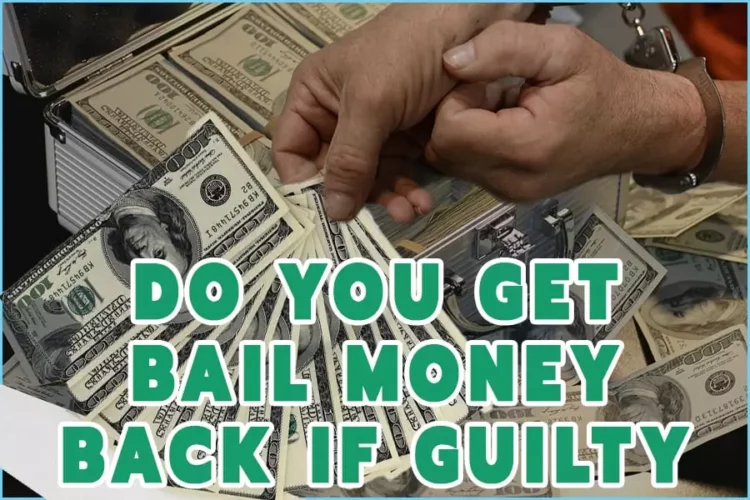An accused person has to go through several compulsory procedures before going on trial. Some accusations are serious, and judges need to place bail amounts before the official trial dates.
An accused person can get temporary freedom before the official trial if they pay bail. The bail amounts vary depending on the nature and seriousness of the offense.
Courts use bail as incentives for the accused to appear before the court on the trial date. According to the law, you are innocent until proven guilty. And this leads to the question,
Do You Get Bail Money Back if Guilty?
You could get your money back if you paid the bail directly through the court. You will get your money regardless of the court verdict. The only time you forfeit your right to get your money is if you posted bail through a bondsman.
You do not get your money back through a bondsman, regardless of the court’s ruling on your case.
Types Of Bail
Did you know that there are several types of bail? Bail varies from one case to the other. You may get different bail types or amounts depending on the nature of the crime or your history.
Bail is not punitive. It is possible to contest the bail amount, but you need legal counsel to advise you accordingly. The bail amount gets set depending on the court’s assessment.
Surety bails are special payments made on behalf of the accused by a third party. Surety bonds get issued by a bondsman in several jurisdictions. These companies specialize in providing funds to those who cannot satisfy their bond payments.
The defendant pays 10% of the bail value to the bail bondsman. Once the amount gets paid, the bail bondsman pays the rest of the bail amount to the court. The expectation is that you will attend your court dates after the bail bondsman pays your bail.
If you skip your bail, the court seeks a warrant for your arrest.
Property bonds are not very prevalent. It is a one-of-a-kind bond only available in particular legal jurisdictions in the United States.
The accused pledges a valuable item in their possession. The court holds the property to encourage the accused to appear at trial.
If the accused fails to appear at trial, the court has the authority to seize the property. In virtually all countries that use property bonds, the equity in the property must be double the bail amount.
Many defendants attend court because they are afraid of losing their possessions. You get the excess amount after settling the bail.
Citations are the simplest forms of bail. They get issued for minor misdemeanors, particularly for light traffic offenses. These include broken tail lights, non-visible plates, or cracked windscreens.
Officers issue the citations, and the accused signs them. They are a pledge to appear before the court at a certain date. The officers issue citations for cases where posting bail or bond is unnecessary.
Racking up citations or failing to appear before the court on the scheduled date leads to hefty fines. The court can issue a warrant for your arrest for failing to appear for your trial.
Recognizance bonds are one of the less severe and non-punitive bond choices. The recognizance is a commitment made before the court by the accused.
The accused promises to follow the conditions of the court. They are not to engage in illicit activities. During the trial, the accused is allowed conditional freedom. The term “recognizance” refers to a pledge made to the court.
Like citations, recognizance bail gets issued for less severe cases that don’t warrant an actual bail or bond amount. Failing to appear before the court still guarantees stiff punishment. You get charged for every violation against a recognizance agreement.
Cash bails are common. The courts set cash bails for sensitive offenses or nearly all types of offenses. Courts set high bail amounts for repeat offenders. A court will try and access the accused character and criminal history before settling on a bail amount.
Once the accused posts bail, they get granted conditional release. Courts normally forgo bail for people with a high flight risk. If you have a history of failing to meet your trial dates, your bail amount may be high.
Cash bail is necessary in many cases, particularly for serious offenses. You get a full refund if you pay the bail directly to the court.
There are two types of offenses, criminal and civil offenses. You can further look at the offenses as either violation against the state or federal violations.
For federal violations, the accused pays a federal bail bond. Federal bail bonds are very expensive for most folks. The accused pays the bonds directly to federal courts. Few bail bonds companies issue federal bail bonds because the process is complicated.
Like other bail types, the accused gets a full refund of the bond amount after their trial. State courts cannot require an accused person to pay a federal bond.
Immigration bonds are distinct from other types of bail. The bail gets classified as a federal bond.
Immigrants who enter the nation illegally are subject to a state immigration bond. Immigration and Customs Enforcement determine the bond amount.
Despite most immigrants getting detained in facilities, there are only a few occasions when immigration officials consider bonds.
Like federal bonds, the bail amounts are usually expensive. State courts cannot issue immigration bails because they lack proper jurisdiction. Many bail bonds companies aren’t allowed to issue immigration bonds.
Why A Court May Refuse To Grant Bail
Bail is not a guarantee. There are many cases where courts refuse to grant a defendant bail. The rights of the accused are in the Sixth Amendment of the constitution. Bail is not a requirement, and the decision rests firmly on the courts.
Some cases are really sensitive. In such cases, courts need to detain the accused during the investigation process. The accused is unlikely to get bail in such cases.
The biggest reason for courts not to grant an accused person bail is if they are a flight risk. It refers to a person likely to skip trial by moving out of the court’s jurisdiction. There are various ways that the court uses to assess flight risk.
Your history is the surest way to determine flight risk. If you have a history of escaping trial, courts are unlikely to grant you bail. Having a stable employment routine could help your case, as courts perceive you as less risky.
The court is likely to give you the benefit of the doubt if you have family in the area.
Your court attendance records are really important. It is one of the things that a court examines before deciding whether or not to grant you bail.
A perfect record helps your case. It shows that you respect the court’s time. However, failing to show up to court doesn’t help your case. You must strive to have good court attendance for a judge to consider bail.
If you fail to appear for your session, the court could find you in contempt. It will issue a warrant for your arrest.
If you have less than perfect attendance, courts can either set a high bail amount or fail to grant bail.
If you have any warrants, you are unlikely to be granted bail. If you receive the bail option, it will almost certainly be a cash-only option.
As a result, you should go to court with a near-perfect record. Your legal character influences the court’s decision. In the eyes of the court, having many warrants paints you in a bad light.
Ensure, therefore, that you have no outstanding warrants, particularly for missing court dates.
If you have outstanding court fines, you are unlikely to be granted bail. It demonstrates that you are unable to satisfy your financial responsibilities.
A judge is more inclined to give accused individuals cash if they have outstanding legal fines. The cash-only option ensures that you will pay the fines.
It will
aid your case if you have no past penalties. Your record should demonstrate that you are compliant and satisfy your legal and financial responsibilities as they become due. Typically, the bail amounts balance the accused’s penalties and other expenses.
Conclusion
Do you get the bail money back if guilty? If you paid the bail directly via the court, you are entitled to a refund. Regardless of the court’s decision, you will receive your money. You would lose your right to your money if you used a bondsman to post bail.
Regardless of the court’s decision in your case, you will not get your money from a bondsman.
Bail is not punishable under the law. It is simply a measure courts take to ensure that people attend their court dates. In some cases, courts deny bail, especially if the accused is a flight risk.










